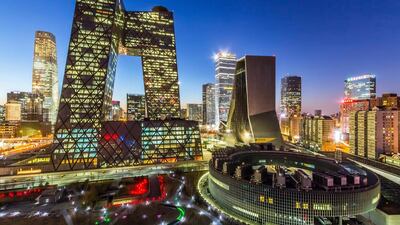Why Beijing?
The Chinese capital is moving at a furious pace, with its skyline of luxury towers and malls, gritty arts scene and a hungry, savvy young generation determined to bridge local and global cultures. Boutique hotels, underground clubs, industrial cultural complexes and hipster hutongs are transforming this business hub into a global centre of cool.
Explore ancient, communist and modern China in this labyrinth of concrete and asphalt, marble and crystal, tradition and hypercapitalism, softened by flashes of poetry, nature and imperial grandeur.
A comfortable bed
The brand new W Beijing – Chang'an (www.starwoodhotels.com) stands above the business district with a shimmery facade and opulent interiors. Crystal chandeliers dominate the lobby, casting a light that sets a glamorous nightclub feel. Elevators lead to the X 25 rooftop lounge, where the city's trendiest acts perform. The party feel lingers in the rooms, with bright tones, patterned light panels, round bathtubs and floor-to-ceiling windows offering panoramic views. Rooms cost from 1,723 Chinese yuan (Dh995), including taxes.
A favourite among the arty crowd, The Temple Hotel (www.thetemplehotel.com) sits in a renovated Qing-dynasty temple. Its eight rooms have a blend of traditional elements and design objects; the hotel also hosts installations by local or international artists. The luxurious restaurant, TRB, is one of the most sought-after in town. Rooms cost from US$300 (Dh1,102) per night, including taxes.
Find your feet
With Beijing’s dense pollution, vast highways and mad traffic, plan your itinerary smartly. Tour operators and guides help facilitate transactions – English speakers here are scarce.
Start at the most majestic site in the city centre: the Forbidden City. Built in the early 15th century during the Ming dynasty by a million labourers, it was home to the emperor of China and his court until 1924. This complex of 980 buildings covering more than 70 hectares is a succession of sculptural marble staircases, elaborately ornate facades made of tropical wood and gold bricks, oneiric gardens, yellow glazed-tile roofs and monumental gates.
Next, head to Tiananmen Square, which is one of the largest public squares in the world at more than four hectares. It was enlarged by Mao, and contains monuments to revolutionary heroes, the National Museum of China, Mao’s Memorial Hall and the chairman’s embalmed body, and the Great Hall of People. This is where, in 1949, Mao announced the founding of the People’s Republic of China. The square was also the site of the 1989 pro-democracy protests, which led to mass killings.
The Great Wall of China requires at least a full day and solid hiking gear. Towering over the city and floating amid the clouds on lush mountains that extend to Mongolia, this military fortress has protected the borders of China since as early as the seventh century BC. Built from materials including stone, brick, earth and wood, it has been renovated, and is now more than 21,000 kilometres long. Climb the misty hills to take in the sweeping views and pure air – a necessary relief from the city smog.
Meet the locals
It might be a challenge to mingle with locals in Beijing, but at night, the city livens up with concerts, cultural performances and parties where the younger generation flock. D Lounge (www.dlounge.com.cn) is a notable spot to mingle with designerwear-clad professionals swinging their hips to cool house beats in theatrical decor – think raw brick walls, arches, a massive white bar and moody lighting.
Dada (www.facebook.com/dadabarbeijing) is a gritty, Brooklyn-style club where the night is soundtracked by psytrance and nu-disco.
Book a table
A tasty Peking duck strikes the right balance between crispiness, fattiness, smokiness and tender, sweet flesh – along with the scrumptious accompaniments of spring onions, plum sauce and pancakes. One of the best tables to savour this local speciality is Duck de Chine (www.elite-concepts.com), an elegant restaurant in 1949 – The Hidden City, an industrial building with exposed beams and brick walls. Here, the duck (188 yuan [Dh100]) is cooked on wood for hours until it reaches the perfect point. Duck de Chine also serves dim sum (150 yuan [Dh85]) at lunch.
The aforementioned TRB (www.trb-cn.com) is a minimalist setting that offers fresh takes on French and Mediterranean classics, such as black cod with white-bean purée (258 yuan [Dh147]), rice-flake-covered lobster (298 yuan [Dh170]) or salmon with foie gras (188 yuan [Dh100]). It's a nice place to indulge, and a change from noodle soups and dumplings.
Shopper’s paradise
The Chinese’s strongest obsession in the 21st century is malls. Indeed, most of life’s activities are concentrated in the city’s massive, simmering shopping centres, in which brands from Nike to Louis Vuitton and Zara compete for consumers’ attention. At the malls, you’ll also find hotpot restaurants, tea houses and lounges.
What to avoid
Crowds can be overwhelming in Beijing, so plan visits with the help of a concierge or guide. Always carry English translations of addresses.
Don’t miss
On a clear day, head to district 798 to explore the art galleries, museums, markets and cafes of this former industrial area-turned-creative hub.
Go there
Return flights from Abu Dhabi with Emirates (www.etihad.com) cost from Dh2,505. Return flights from Dubai with Emirates (www.emirates.com) cost from Dh2,425.
weekend@thenational.ae
Follow us @TravelNational
Follow us on Facebook for discussions, entertainment, reviews, wellness and news.

